Welcome aboard our review of the best Wi-Fi 6 Mesh systems. This is the ultimate hardware for large homes and workplaces!
To find out which of these awesome pieces of kit were the best for the job, we tested a whole load of them.
And overall, we found the very best to be the ASUS ZenWiFi AX AX6600 because it offers great speeds at vast distances and all for a very reasonable price.
ASUS ZenWiFi AX (XT8) AX6600
Best Overall
- Tested max speed: 836.45 Mbps
- Standard number of satellites: 1, 2 or 3
- Range of each satellite: 100ft
- Recommended for: plans up to 1200 Mbps
- Warranty: Two years
Nonetheless, there are more powerful systems out there if you feel like you need them.
Plus, there are cheaper ones! So there might be another Mesh Wi-Fi 6 system out there that’s better suited to you. Stay with us as we review a few others as well for that reason.
Without further ado, let’s find out what the best Wi-Fi 6 Mesh systems are.
Top 5 Wi-Fi 6 Mesh systems
Here’s a breakdown of our favorite Wi-Fi 6 Mesh systems by category.
- #1 Best Overall: ASUS ZenWifi AX AX6600
- #2 Best for budget: TP-Link Deco AX20 AX1800
- #3 Most powerful: Netgear Orbi RBK852
- #4 Widest range: TP-Link Deco AX60 AX3000
- #5 Best for security: ASUS ZenWiFi AX Mini XD4
5 Best Mesh Systems for Wi-Fi 6
Check out why we made those decisions and find out the best and worst things about each of these 5 Mesh systems.
#1 Best overall: ASUS ZenWiFi AX AX6600
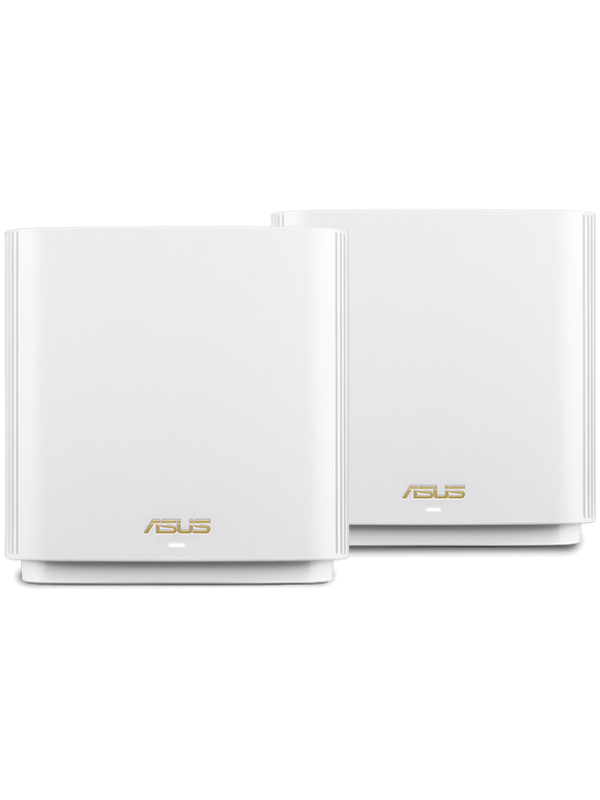
- Tested max speed: 836.45 Mbps
- Standard number of satellites: 1, 2 or 3
- Range of each satellite: 100ft
- Recommended for: plans up to 1200 Mbps
- Warranty: Two years
Pros
- Fast speed
- Great range
- Tri-band for more bandwidth
- Useful features (QoS, Parental Controls, etc)
Cons
- Slower 2.4 GHz band
- No WPA3 security
In our opinion, there isn’t a better Mesh system out there in terms of value for money than the ASUS ZenWiFi AX AX6600. It offers awesome power, fantastic features, and top-tier security and all at a price that will pleasantly surprise you.
Let’s start with the power. We tested the speed of this thing from 5ft away and managed to hit a download speed of 836.45 Mbps. That’s really fast. When we tested life at 800 Mbps, we found that it would be more than enough for pretty much anyone, a workplace of 10-20 people even!
When you kick off your Wi-Fi 6 Mesh system with the ZenWiFi AX AX6600, you can either go for one, two or three satellites. There’s not much point just taking the one as you may as well just get a normal router if that’s all you need.
These satellites have a range of around 100ft and by adding more of them, you can extend your network range seamlessly. That means you won’t need to connect to a new network as you move from satellite signal to satellite signal. And that is the beauty of Mesh!
This is a tri-band router. This means there is the addition of a second 5 GHz band above and beyond the original one and the 2.4 GHz one. This frees up bandwidth and allows for more devices to perform better on the more powerful 5 GHz.
There are some cool extra features here too. A key one of these is ASUS’s AiProtection Pro which is, we think, one of the best router security features out there. It bundles together parental controls to protect vulnerable network users and antivirus tech to keep out external threats.
On top of this, you’ll be able to enjoy two years of warranty from ASUS on each of the devices you buy. That’s double the peace of mind you’ll get from some other manufacturers, time-wise.
If you have an internet plan up to around 1200 Mbps (due to the third band) and a large enough home to warrant buying Mesh, you may not need to look any further than the ASUS ZenWifi AX AX6600 system.
#2 Best for budget: TP-Link Deco AX20 AX1800
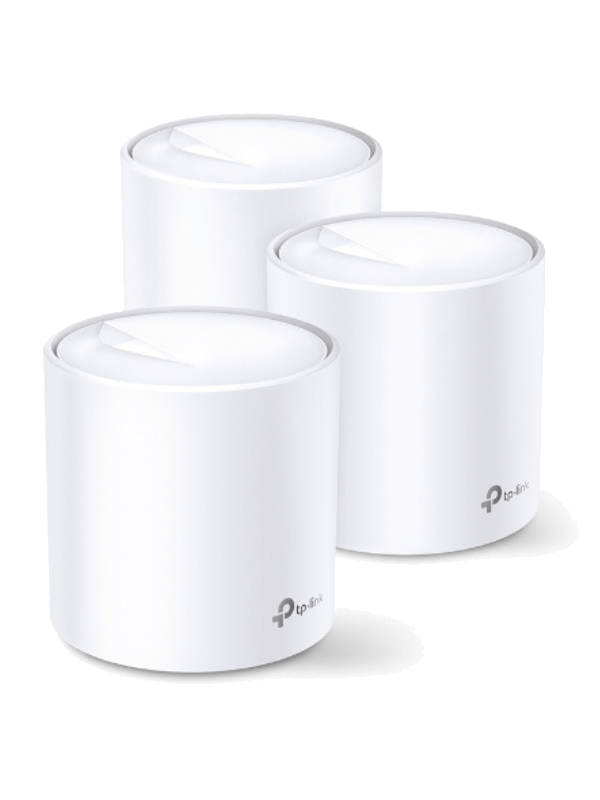
- Tested max speed: 695.05 Mbps
- Standard number of satellites: 2 or 3
- Range of each satellite: 95ft
- Recommended for: plans up to 600 Mbps
- Warranty: Two years
Pros
- Quick speed
- Excellent range
Cons
- Slower 2.4 GHz band
These days, you don’t have to spend a huge amount of cash for a Wi-Fi 6 Mesh system and that’s pretty new. Devices like the TP-Link Deco AX20 AX1800 have made Wi-Fi 6 Mesh a lot more accessible for those on a budget.
And you don’t even have to compromise too much on performance for this offering. We found that it could clock a speed of 695.05 Mbps, and that’s not bad at all considering how much more affordable this Mesh system is compared to the competition.
At 700 Mbps, you’ll be able to appease 10-15 pretty heavy internet users, or over 20 more moderate users.
The range of each satellite isn’t quite as strong as some of the more powerful options. You won’t be able to space satellites any more than 90-95ft from each other, but that still ain’t bad at all. It’s another for a medium sized home in itself, but when you add more satellites you can cover a lot more ground.
There are good features here too. You can enjoy Alexa compatibility, allowing you to control your network settings with your voice. Plus, there’s TP-Link HomeShield, a neat antivirus feature to help keep any external threats away from your home network.
A fantastic affordable entry into Wi-Fi 6 Mesh for those with internet plans up to 600 Mbps!
#3 Most powerful: Netgear Orbi RBK852
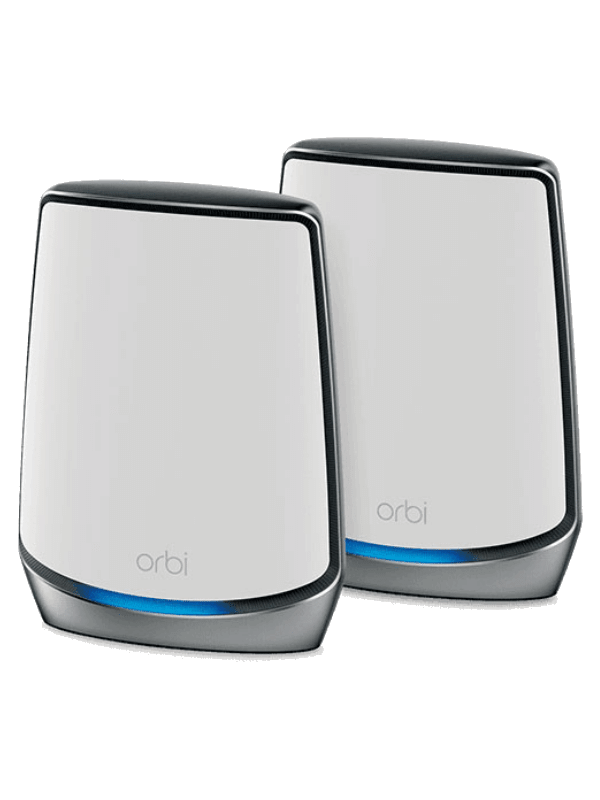
- Tested max speed: 851.86 Mbps
- Standard number of satellites: 2 (RBK853 has 3)
- Range of each satellite: 125ft
- Recommended for: plans up to 800 Mbps
- Warranty: One year
Pros
- Super quick
- Great coverage
- Fast satellites
Cons
- Expensive
- No USB ports
Those looking for the max amount of power a Wi-Fi 6 Mesh system has to offer may find themselves choosing the Netgear Orbi RBK852. In our tests, it was the fastest. But not by much.
When speed tested from 5ft away, the Orbi RBK852 clocked in at 851.86 which is, of course, very impressive. Once again, it’s more than enough for any sized family or a workplace as many as 20 people. It is only 15 Mbps than the ZenWifi system though, and a lot more expensive.
It does justify its much more expensive price tag in another way, however. The individual range of the satellites is a little better than the ASUS ZenWifi offering with up to 125ft per satellite. So we recommend doing the math based on the size of your home before you pull the trigger on either offering.
Part of the reason the Orbi system is so powerful is that it features a backhaul 5 GHz band on top of the standard 2.4 GHz and 5 Ghz ones. This cannot be used to connect to devices, simply to other satellites.
But, it does have the effect of making the satellites very fast, meaning you should be able to get fast speeds on your device no matter how far away you get.
The Orbi RBK852 kit comes with two satellites but if you want three, you could opt for the RBK853. Or, there’s a 4 pack called the RBK854.
There’s great security available here thanks to Netgear Armor. This is fantastic antivirus technology that comes for free. Plus, you’ll get limited parental controls to look after the kids, but for the more advanced version of this you’ll need to pay for a subscription.
One downside here is that you do only get one year of warranty as opposed to the rest of our recommendations which give two. You’ll probably never need to use it, but the extra peace of mind of an additional year will definitely be appealing to some people.
Either way, if you want one of the most powerful Mesh systems on the market then the RBK852 should surely be considered.
#4 Widest range: TP-Link Deco AX60 AX3000
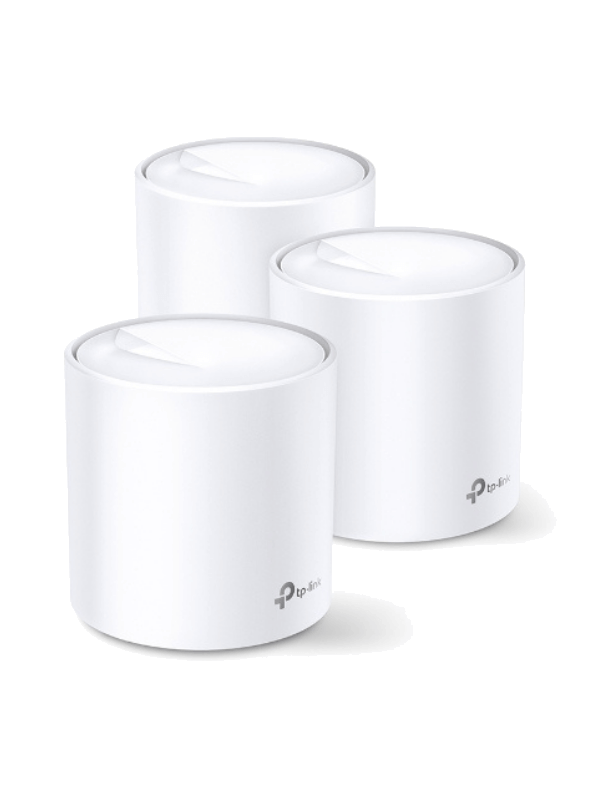
- Tested max speed: 821.81 Mbps
- Standard number of satellites: 2 or 3
- Range of each satellite: 100ft
- Recommended for: plans up to 800 Mbps
- Warranty: Two years
Pros
- Fast
- Superb coverage
- Good features (QoS, Parental Controls, etc)
Cons
- Does not support 160 Mhz (for the fastest speeds)
Looking for a good individual satellite range but don’t want to spend a huge amount for the Orbi RBK852? The TP-Link Deco AX60 AX3000 is worth looking at.
At 100ft per satellite, you’ll be able to spread out your satellites around a very large home indeed. And each of them offers good performance too. We found the speed of the network to be 821.81 Mbps from 5ft away, keeping it up there with the big boys for a lower price.
At speeds of over 800 Mbps, you’ll be able to cater to as many as 10-20 pretty heavy internet users!
Your Deco AX60 pack can either be two or three satellites, so work out how many you need before you decide to buy it as the three satellite pack offers better value for money. However, you can always add more of them at a later date.
But what else do you get for your money other than decent speed and range? Well, there’s TP-Link HomeProtect included. That’s a decent bit of antivirus kit that will help to keep your network free from outside threats.
You’ll also get QoS and parental controls to help you have better control over your network. The former assists you in directing more network attention to certain devices for an extra performance boost whereas the latter helps restrict certain content to certain devices or users.
There’s also two years of warranty in the bag with AX60 just like with most of TP-Link’s Mesh systems. So, this is definitely another solid all-rounder, and perfect for those with large homes and internet plans up to 800 Mbps!
#5 Best for security: ASUS ZenWiFi AX Mini XD4
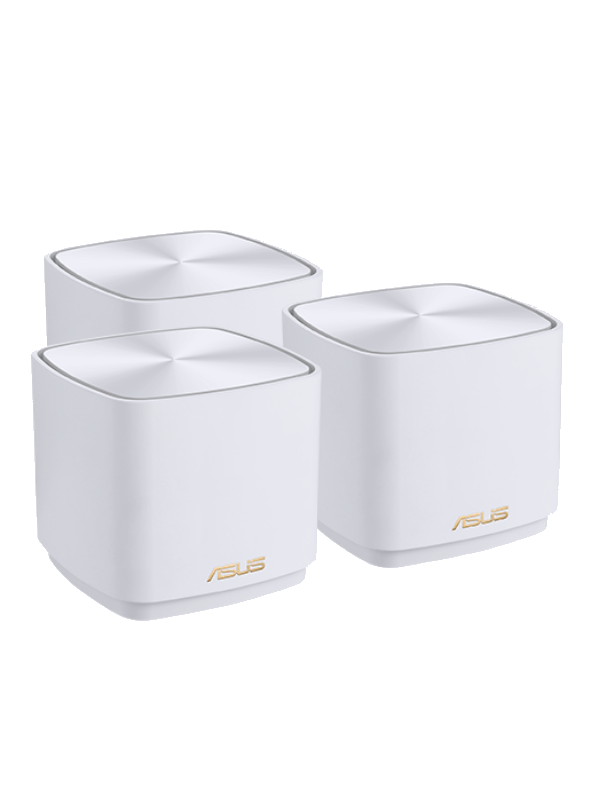
- Tested max speed: 721.67 Mbps
- Standard number of satellites: 3
- Range of each satellite: 70ft
- Recommended for: plans up to 600 Mbps
- Warranty: Two years
Pros
- Pretty Fast
- Fantastic coverage
- Good features (QoS, Parental Controls, etc)
Cons
- Could be cheaper
You don’t need to go for the more expensive ASUS option to enjoy excellent ASUS security. Its little brother, the ASUS ZenWiFi AX Mini XD4, brings it too.
Those with internet plans under 600 Mbps (and perhaps slightly smaller homes) might even wish to opt for this system over our main pick. We managed to achieve a download speed of 721.67 Mbps from 5ft away with this. That’s plenty for a large home full of people!
We also found the range of each system to be a little on the low side at 70ft but again, each module here is a lot cheaper so it kind of balances out. 70ft on its own would still cover a one bedroom apartment.
Then there’s the features. You get just about everything with the Mini that you do with the big brother AX6600. And our favorite of these is the AiProtection Pro security. With this, you get free antivirus and parental controls for life.
These are essential for security. Not only does AiProtection Pro block outside threats in the form of viruses, but you can keep vulnerable internet users from seeing or downloading harmful content.
Another great Mesh system and one that should be considered by anyone who doesn’t feel like they need quite as much performance as some of the more expensive options.
Wi-Fi 6 Mesh System Buying Guide
These are the main things to consider as you scope out your new Wi-Fi 6 Mesh system. And if you still find yourself asking questions after reading through, you could always consult our ultimate router buying guide.
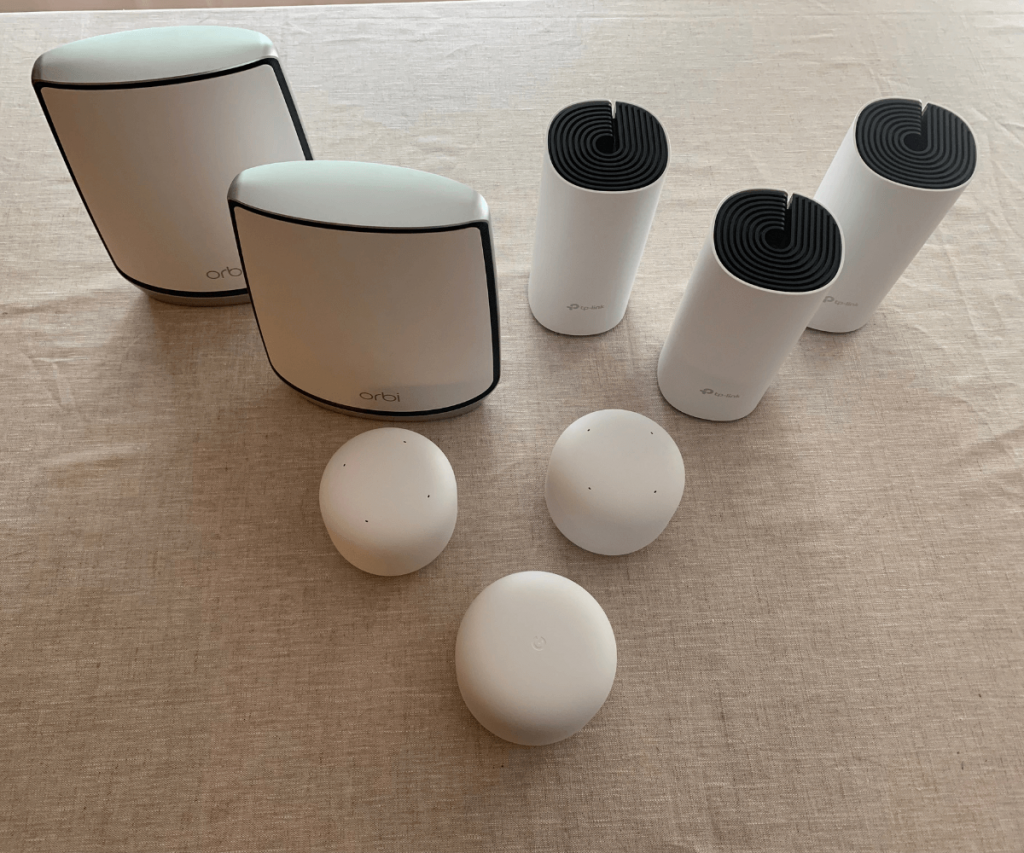
When do you actually need Mesh?
There’s really no need to buy Mesh in the first place unless you have a large home. We recommend Mesh to anyone who has a home of 3000 sq. ft. or more.
Mesh allows you to add several satellite ‘nodes’ to your network that you can connect to without having to join a new network. This means you can move from satellite to satellite without having to connect to a new network each time and dropping your connection.
But there’s also the option of a Wi-Fi repeater. Could you just get away with buying a standard Wi-Fi repeater instead? That’s up to you. To help you make that decision, we compared the two and you can check out our findings here.
How about Wi-Fi 6?
When we compared Wi-Fi 5 and Wi-Fi 6, we found that the latter was worth it for internet plans of 600 Mbps or more or those who want to connect 20 or more devices to their network.
We’ve been talking a lot about Wi-Fi 6 today but it’s important to know when it’s worth opting for or when you can get away with saving some money by going for Wi-Fi 5 instead.
Wi-Fi 6 is a Wi-Fi protocol that was released in 2019 as an update to the older Wi-Fi 5. It can be up to 250% faster and have a better range than Wi-Fi 5 but it is more expensive. That’s why it’s only really worth it for fast internet plans.
Wi-Fi 6e Mesh systems
We’re slowly seeing the introduction of Mesh systems that support Wi-Fi 6e, although right now they’re really expensive. But is it worth it?
Wi-Fi 6e is an updated version of the Wi-Fi 6 protocol that came about in 2021. It’s even faster than Wi-Fi 6 as it comes with a third band 6 GHz. The range of the band is short but it supports crazy speeds.
We recommend Wi-Fi 6e for anyone with Gigabit internet plans. Up until that point, it’s not going to be worth the additional cost.
Note also that a lot of devices do not support Wi-Fi 6e yet due to that 6 GHz band. So make sure you check out device compatibility if this is something you’re considering.
Tri-band routers
Some Mesh systems can be ‘tri-band’. That means either an additional 5 GHz band or a 6 GHz band as mentioned above. But what exactly is the point of having another 5 GHz band?
Freeing up bandwidth is the answer to that. The 5 GHz band can become a bit congested if a lot of devices are trying to connect to it. So if you’re looking to add more than 20 or so devices that support 5 GHz, a tri-band Mesh system such as the ASUS ZenWiFi AX AX6600 could be worth it.
Tri-band routers also make the satellites faster, especially if the third band is a ‘backhaul’ one, such as in the case of the Netgear Orbi system. This third band is only used for connecting between satellites and this allows them to hold onto fast speed throughout larger Mesh systems.
For more info, check out our article on dual-band vs. tri-band routers.
How many satellites should I buy?
It’s a good idea to work out how many satellites you need for the size of the space you are trying to provide network coverage too.
Generally, a large home will be good with two or three but if you are trying to fill a super large home or office space then you may need more than that.
The websites of the manufacturers of the devices should give you a good idea as to the kind of space each satellite will cover so you can base your decision on that.
Controlling app and extra features
A decent Mesh mobile app goes a long way to making your life easier when setting up your Mesh system or controlling the settings of it. If you can add extra satellites to your network at the press of a button in an app then you’re going to save yourself a whole lot of time.
It’s also great to have an app to be able to control the likes of parental controls and QoS. If you’re not sure what these are, let us explain.
Parental controls are a way to keep inappropriate or harmful content away from vulnerable users, ie. kids. You can restrict access to different kinds of contents for specific devices with good parental controls, sometimes on a timer.
Then there’s QoS. This feature allows you to select one, two, three or sometimes more devices on the network to be singled out for network priority. At the deficit of the performance of any other devices on the network, your preferred devices will get a power boost which is really useful for gaming or downloading large files for example.
It’s also worth considering voice controls through the likes of Alexa. That might sound like a bit of a gimmick but once you’ve actually tried it out you’ll realize how much easier it can make your life. You can often set up parental controls, QoS, and more with your voice.
A word on security
Network security is even more expensive on a Mesh system than it is with a regular router network.
That’s because a) there are more devices and therefore a higher chance that things can go wrong and b) you’re likely to have more devices connected to your network which increases the overall risk factor.
If a Wi-Fi network becomes compromised through the router, so too can every single device that’s connected to it. This can be pretty catastrophic in some circumstances, and we’re not saying that word lightly!
That’s why we feel it’s super important to protect your home network. Opt for a router that includes free antivirus technology or at least one that allows you to subscribe to it. It’s always better to be safe than sorry with this kind of thing.
You can also learn more about how to secure your home network here.
Wi-Fi 6 Mesh System FAQ
We’ve noticed a few common themes for people’s questions surrounding Wi-Fi 6 Mesh. Here are some of the questions we’ve seen popping up the most.
What other hardware do I need for Mesh?
If you have cable broadband, you’ll also need to buy a modem in order to access the internet. It’s not the same for fiber optic broadband. If you do have cable and don’t have a modem yet, take a look at our guide to the best modems out there.
How many satellite nodes can I add to a Mesh system?
The answer to this question depends on the Mesh system you’ve opted for. Some will allow you to add five or six whereas others will allow you to add as many as 10.
Just be aware that as you add more satellites, you’re likely to lose a bit of performance each time. So by the time you get to the tenth satellite, your internet speed will probably be a lot slower than it was at the start.
How well a Mesh system holds onto its speed also depends on the quality of the individual nodes so if you’re planning on adding a fair few then it’s better to go for a more powerful system.
When will Wi-Fi 7 Mesh be available?
Desperate for more speed from your Wi-Fi 6 Mesh system? You’re bound to get a big injection from it when Wi-Fi 7 is eventually released and manufacturers start developing Wi-Fi Mesh systems that support it.
It might be a little while until this happens though. We probably won’t see any Wi-Fi 7 until at least late 2023 or 2024.
Wrapping Up On Wi-Fi 6 Mesh Systems
There’s no denying that Wi-Fi 6 Mesh is some of the coolest network technology out there. It used to be so expensive but now it’s more affordable than ever.
And a great example of value for money with Wi-Fi 6 Mesh is the ASUS ZenWiFi AX AX6600, hence why we feel that this is the best one. It’s so fast and packed with features but it comes at a price that’s very reasonable indeed.
However, it might not be the perfect option for you. So make sure you consult our recommendations and buying guide as you go about trying to decide on the right Wi-Fi 6 Mesh system for yourself.
